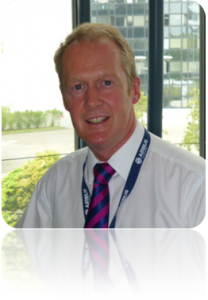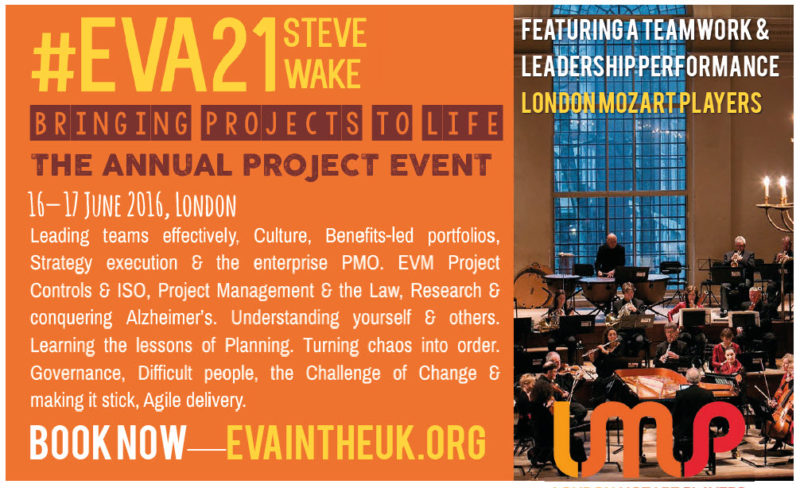Category Archives: earned value
Mark C Robinson
Mark C Robinson, Head of Business Performance A350XW, Airbus SAS
Summary:
‘Don’t boil the Frog’ – disruption and digitalization
Mark takes a candid look based on his personal experience of the effect and future impact of disruption and digitalization on the PM profession. What he terms the ‘Extinction event’

Mark is a highly experienced Programme Manager and Chartered Engineer of complex transnational Projects/Programmes in the Aerospace and Defence Industry and graduated from the school of ‘Pragmatic Programme Management’. Also holds an MBA from Cranfield University
In his current role he is accountable for the Business Performance Management of the new A350XWB family of Aircraft. Scope includes Programme Ramp-Up enablement, Business Improvement Platform, Cabin and Customisation and Process Methods and Tools including Digitalisation. He lives and works in Toulouse South West France and loves to eat the local speciality – Duck !
‘We make it fly’.
Airbus makes the freedom of flight possible by designing, manufacturing and supporting the world’s best jetliners. Its people around the globe are united by a passion for aviation, as well as their desire to create better, more efficient ways for airlines and passengers to fly.
Commercial Aircraft is a core business of Airbus – a worldwide leader and Europe’s largest aeronautics and space company – which also incorporates divisions specialised in space and defence, as well as helicopters.
Mark C Robinson
Head of Business Performance A350XWB
31707 Blagnac Cedex
FRANCE
Tel +33 (0) 567195432
mob +33 (0) 625982508
e mail mark.robinson@airbus.com

Bringing Projects to Life
Bringing Projects to Life
The Annual Project Event for knowledge, know how & networking!
Conference: 16-17 June 2016 [=16 PDU or CPD points]
Workshops: 14-22 June 2016
Armourers’ Hall, Moorgate, London
eVa Coming of Age
In its 21st year earned value comes of age. It has recently been announced that EVM will become an ISO standard. For many, the creation of a standard is the reason why they started out on the EVM road. For others it is the starting gun, and for some it is just another step in a long journey.
The development and impact of this global standard is just one of the many topics to be covered at this year’s conference. The rise of the PMO and the transition to Agile will be considered along with the emerging challenges and massive opportunities facing Project Managers today.
A touch of culture
 Culture and behaviour are a prominent feature in any eVa programme. This year is no exception. The London Mozart Players will provide powerful insights to leadership, teamwork and tackling conflict. Those who know Dennis Potter’s ‘Blue Remembered Hills’ may have an inkling of how this will play out!
Culture and behaviour are a prominent feature in any eVa programme. This year is no exception. The London Mozart Players will provide powerful insights to leadership, teamwork and tackling conflict. Those who know Dennis Potter’s ‘Blue Remembered Hills’ may have an inkling of how this will play out!
We are delighted that Murray Easton, CBE will be sharing how to tackle cultural change and behaviour on a massive scale from the perspective of someone who has actually done it!
The finest speakers
 For engineers and scientists several cutting edge topics on the two-day programme will be of particular interest. The application of Earned Schedule and how it is fast becoming mainstream, along with fresh thinking on EVM performance measurement based on user experience at CERN.
For engineers and scientists several cutting edge topics on the two-day programme will be of particular interest. The application of Earned Schedule and how it is fast becoming mainstream, along with fresh thinking on EVM performance measurement based on user experience at CERN.
As ever the speakers are selected for the newness of their thinking or the originality of their approach and an avoidance wherever possible of déjà vu. Presentations you see at eVa are normally the first time. And presenters, when they come back, never do repeats.
We also invite speakers of influence to give a view on their activity. This year we will hear from speakers; Reinhard Wagner, IPMA and Antonio Rodriguez, Professor Instituto de Empresa in addition to; the NAO, CERN, Saïd Business School in addition to Crossrail, CH2M and BMT. Several of this year’s line-up are heavily engaged in ISO EVM activity but all are more than capable of Bringing Projects to Life.
>> Conference Programme
>> Workshops
>> PMC SIG Free Packages
Paul Kidston Lee McDonagh Dan Wynne
Using Earned Value in the NEC contract
EVM is widely used throughout industry and the NEC is extensively used within infrastructure.Increasingly EVM and the NEC are being used on large infrastructure projects. The APM’s Planning, Monitoring & Control (PMC) Special Interest Group (SIG) posed the question ‘can EVM work with the NEC?’ We say the answer is ‘Yes’ and this presentation presents some of the reasons why. This presentation provides an update on the efforts towards a white paper that is planned to be presented in the autumn of this year.
Paul Kidston, Costain

Paul Kidston is currently the Project Controls Director for Costain. He has spent the last 15 years in leadership roles in the field of project controls and planning. Prior to that Paul was a Project Manager and has worked on many iconic construction projects including the rebuilding of the Tottenham Court Road Station, Crossrail, Smithfield Market and Paddington Station. Paul is the lead author of the APM’s best selling book, “Planning, Scheduling, Monitoring and Control” published in 2015.
Lee McDonagh, MACE

Lee is a Project Controls Director for Mace with over 20 years’ experience in the infrastructure construction industry. Currently he is seconded in to TfL delivering Project Controls for 4LM a £5.4bn signalling upgrade to the sub surface railway. Previously, Lee led the Programme Controls team for the Transformation of the Queen Elizabeth Olympic Park after the London 2012 games, ensuring that the project was delivered on time and on budget.
In Lee’s 20 year career he has had broad experience of engineering and planning a diverse portfolio of infrastructure projects from widening the M25 motorway, constructing a station on the Jubilee Line Extension, extending an airport terminal and delivering the London 2012 Olympic and Paralympic Games.
Dan Wynne, Gardiner & Theobald LLP

Daniel has over 20 years major infrastructure experience working alongside major clients, delivering both transformational projects and change programmes to improve total client and supply chain capability. During this time he has worked on some of the UK’s largest infrastructure programmes, often undertaking roles in the disciplines of project and programme management.
Daniel has experience in aviation, rail, defence, highways, utilities, pharmaceutical and in both the establishment of PMO’s and the review of the efficiency of existing client organisations.



Back to Conference programme
Chiara Mainolfi
Chiara Mainolfi, APMG Italy
– chiara.mainolfi@apmg-international.com
The Talent Club. No-one gets left behind

Summary: Despite high levels of unemployment, the Information and Technology (ICT) sector still suffers from severe skill shortages. The mismatch between the skills available and the needs of the labor market concern all Member States of the European Union, to varying degrees. Forecast vacancies by 2020 reach a figure of 825,000, and many of these will remain unfilled. Moreover, a gender ICT gap is still growing in Europe.
APMG–International, the accreditation and examination body has created an initiative to improve the competencies of professional people across Europe to increase their employment opportunities. APMG has made a pledge with reputable Public Administration institutions and other key stakeholders including Business schools and universities, CIO associations, career networks and Accredited Training Organizations to work collaboratively to address this issue.
Originally piloted in Madrid and Bilbao, Talent Club was started to improve the IT competences of unemployed women. Talent Club encourages and supports women and men to get started and grow within the ICT sector. The aim is to equip them with the knowledge, guidance, tools and techniques required to start an ICT career. All the participants from the first pilots now have a job.

eVa22
eVa22 – Brexibility
The best independent event for the project professionals who like to think about what they do!
Conference: 17-18 May 2017
Armourers’ Hall 81 Coleman Street, Moorgate, London, EC2R 5BJ

Brexibility: This year EVA focuses on the New Normal. A fantastic place for a kick-start and a reboot of Project Controls in your career, your projects and your life.
There is nothing better than a perceived crisis to make people get serious. In times of prosperity many of you will have seen how slack and undervalued Project Controls and Governance can be. But we have entered a window of opportunity to have another go at getting things right.
Governance that really does join projects to portfolios. In an agile flexible way.
Project Controls central to the PMO toolset, properly managed and executed. A proper career path with some qualifications!
Performance Management which is understood implemented and used.
Getting your voice heard, your input sought and valued. There has never been a better time to prove your worth, to get the attention of the people at the top. Or you might be at the top wondering whether to jump. Come along talk listen learn discuss and see where it leads you.
As ever, #eVa22 will be different, entertaining and informative. Dinner will be served in the Hall by candlelight.
Attendees are middle to very senior professionals with interests in project management generally, project controls, earned value and wanting to learn more about wider issues of transformation, successful change and benefits-driven portfolios.
They will also be very keen to set Project Controls onto a formal career path this year and are looking for like minds who will lobby for and champion this, as well as networking and business leads.
Government Defence Aerospace Construction Utilities Transport Power Generation and IT sectors are represented.
All eVa conferences are filmed for web broadcast by the PM Channel as well as support from the trade press and social media.
Sponsors will each be allocated a clear space, power supply and either a table or stand space on the networking area where delegates network between sessions in the pre-conference, mid morning, lunch and afternoon breaks and during the break out sessions.
Main and Gold sponsors may erect suitable stands. Sponsors will be able to distribute brochures to all delegates. Erection of stands will be early morning on the day of the event or previous day by arrangement.
Every sponsor’s logo will appear on all marketing and event documentation produced by the organisers.
Simon Taylor
Shining a light on Major Projects
 Interview by Jason Hesse, Project Magazine [Summer 2016 edition] with National Audit Office’s Geraldine Barker, whose role is to shine a light on how major projects are delivered by government. Geraldine will be speaking at Bringing Projects to Life conference #eVa21 on 16 June
Interview by Jason Hesse, Project Magazine [Summer 2016 edition] with National Audit Office’s Geraldine Barker, whose role is to shine a light on how major projects are delivered by government. Geraldine will be speaking at Bringing Projects to Life conference #eVa21 on 16 June
Delivering large-scale infrastructure and transformation projects is a struggle for any organisation, whether public or private. A report from the National Audit Office (NAO), published earlier in 2016, took a deep dive into the government’s delivery of major projects.
Delivering Major Projects in Government was published by NAO director Geraldine Barker and her team, following a comprehensive review of the government’s Major Projects Portfolio. The report was a wake-up call for government, highlighting that project delivery must improve.
There are currently 149 projects in the Major Projects Portfolio, and these have a combined whole-life cost of £511bn, of which £25bn is expected to be spent in 2015–2016. Getting these projects wrong would be disastrous for the public purse. The role of Barker’s team is to identify what the systemic issues affecting the projects may be, and to ensure that public money allocated to major projects is well spent.
“Parliament votes large sums of money for projects. Our role is to make sure the money is spent in the way that parliament intends, and it delivers value.”
ACCOUNTABILITY
The public sector has improved at delivering projects successfully, but further enhancements are needed. While the Infrastructure and Projects Authority (IPA) – formerly the Major Projects Authority – and government departments have taken steps to develop capability and provide assurance on improving project delivery, it is vital to improve the consistency and reliability of data surrounding project success.
One third of projects that are due to be delivered in the next five years are rated as ‘in doubt’ or ‘unachievable’ if action is not taken to improve delivery.
The success of these projects is paramount if government is to become more efficient at delivering services. Indeed, nearly 80 per cent of the major projects due to be delivered by 2019–2020 have a transformation or change agenda for how services are delivered or accessed.
Barker, who has spent the past 16 years at the NAO, knows that the key to improving these projects is better data, which, in turn, can help identify weak areas that need to be addressed.
“With the start of the new parliament, we thought that it would be useful to get some context on projects, given how integral project delivery is to the activities of government, as well as highlighting the issues and weaknesses,” she explains.
While positive steps have been taken around accountability, the changes have not gone far enough.
“The IPA has done a lot to try to address issues around accountability – establishing the owners for projects – and there has been a lot more assurance than there was at the start of the last parliament,” Barker says. “But the data provided by departments isn’t transparent enough.”
One example is costs. “Quite rightly, the IPA wants major risky projects to go into the portfolio at an early stage, but the costings are uncertain,” she explains. “They might know how much money is required to prepare and plan the project, but the detailed whole-life cost will not have been entirely worked out, as the data is incomplete.”
The assessment of costs is an important mandate for the NAO, so understanding how much projects will cost – and how the money will be spent – is important.
“Parliament votes large sums of money for projects. Our role is to make sure that those delivering the projects are spending the money in the way that parliament intends it to be spent, and that it is delivering value to the taxpayer,” says Barker.
She has identified planning as a key lesson for this, and says that project managers ought to spend more time planning: “Do not start making early announcements about projects before having had the chance to plan them through properly. We need to see more emphasis on what it is that the project is trying to solve, instead of just jumping to a solution.
“Have a good, long think about why the project is necessary, and the different ways that you could meet those objectives.”
Having a good challenge function in place can help with this. Taking a little more time at the early stages of the project to challenge your thinking can pay dividends.
“We saw this with Crossrail,” Barker explains. “[Project managers] spent a long time on planning, and they got a lot of challenges back from the Major Projects Review Group. Despite it being a painful process for them at the time, the project ended up benefiting from this.”
DATA CHALLENGE
Accurate, reliable data is at the heart of successful project delivery, and the complications of collating this data in the Major Projects Portfolio is one of the root causes for the NAO’s challenging assessment in the recent report.
“There are still many gaps in the information that the IPA holds,” Barker explains. “It is doing a lot to try to improve how benefits are articulated, but we feel that there is still a lot that needs to happen around the data more generally.”
When asked why there are such weaknesses in the data, Barker is unable to give a full answer. “I’m not really sure that we’ve got to the bottom of it,” she says. “Whenever we do deep dives into projects – HS2 or Crossrail, for example – getting good data is consistently an issue. Sometimes there are time lags, which are entirely understandable, but we need to take a much closer look at how data is collected and reported.”
“Whenever we do deep dives into projects, getting good data is consistently an issue. We need to take a much closer look at how data is collected.”
The standardisation of data is an issue. Project managers are always able to answer specific questions posed by portfolio managers and government departments, but the questions – and the data that is requested – are often posted in different ways, which makes it hard to compare data sets.
TRANSPARENT COSTS
This all leads to the most important issue: cost. The challenge of improving portfolio management at departmental and governmental level has often led to difficulties in assessing, in the planning stages, what will be the project’s full cost.
The general point, says Barker, is how this affects transparency.
“How can we ensure that decision – makers know what the cost will be of what they are agreeing to? How can parliament better understand what it is voting for when allocating money to projects?”
This does not mean having to come up with one final figure for any given project, she adds. There is currently a lot of pressure on the public sector to come up with figures, and taxpayers rightfully want to know how much a project is costing them, but coming up with one specific figure is unrealistic in major projects.
Instead, says Barker, why not encourage departments to educate and explain the uncertainty that surrounds major projects, and come up with a range of costs? “That would be a much healthier discussion, as it would help everyone understand the variables and risk involved,” she says.
The NAO’s role in assessing projects – by uncovering how money is being spent and looking at how waste can be avoided – is not easy. The lack of data and the difficulty in accurately determining a project’s likelihood of being delivered successfully, on time and on budget, is a challenge. Yet, clearly, improvements are required for success rates to rise.
But, for Barker, the job of shining a light is done. “Given the scale and length of major projects, it is important to review them periodically, instead of just waiting to the end, when it is too late to fix them.”
>> Conference programme <<
Martyn Loukes, B.E.M
Martyn Loukes, B.E.M
Diversity is good for business

Martyn Loukes BEM is an award winning and HRH honoured global diversity leader in industry, most recently employed by Transport for London (TfL) as a Business Development Manager in their Customers, Communications and Technology division. Martyn’s background is in communications, finance (qualified Chartered Management Accountant) and project management (Prince2 Practitioner).
He most recently ran TfL’s Lesbian, Gay, Bisexual and Trans Network (LGBT) for over four years stepping down in September 2016. His work in diversity continued to December 2016 where he ran the UK’s largest HIV testing event, and launched the London Gay Men’s Chorus’ 25th anniversary concerts at both Angel and Tottenham Court Road Tube stations.
Martyn was the first person in the world to devise an LGBT themed transport programme – #RidewithPride. This saw London’s first rainbow zebra crossing, a rainbow bus, taxi and Dockland’s Light Railway (DLR) train celebrating diversity, which has since been copied in many other cities. He also introduced the LGBT traffic lights in Trafalgar square which he launched with the Mayor Sadiq Khan in 2016.
Martyn’s specialism is communications, combined with diversity has seen OUTbound become one of the highest profile networks in the UK. His network includes the organisers of Pride in London, Editors of Gay Star News and Pink News, Terence Higgins Trust and a host of other network chairs and leaders. He is very well known in the LGBT community and there are many articles on his work available on the internet.
In January 2017 Martyn left TfL to concentrate on his diversity work.
Awards and Accolades
• British Empire Medal – Queen’s Birthday Honours June 2015
• Freedom of the City of London November 2015
• Top 50 Global Diversity Leader in Industry 2015 and 2016
• Winner Inclusive Network’s ‘Best Community Engagement 2015’ for #RidewithPride
• Finalist as for Network Leader of the Year 2015 for Inclusive Network
• Pink News finalist for Best Public Sector Network in 2015 and 2016
Email: martyn@loukes.net
Twitter: @Martyn Loukes @Agile_Diversity
Blog: www.loukes.net
Jurgen De Jonghe
 Jurgen started off his career in automation of business processes and administrative workflow. The tools developed by him and his team are currently still in use by over 10,000 users.
Jurgen started off his career in automation of business processes and administrative workflow. The tools developed by him and his team are currently still in use by over 10,000 users.
Since 2000, he has been in charge of providing project management consultancy and tools for internal use at CERN. These tools have been used in a variety of projects ranging from the ATLAS detector (the largest particle physics collaboration ever), the LHC accelerator, the European grid project and for planning all strategic activities at CERN.
Jurgen has over 15 years of experience leading a software development team for medium to large software development projects. He also managed a group in charge of the Supply Chain and Facility Management at CERN.
He is currently part of the management of the group providing overarching project coordination for the accelerator complex (including layout management, integration, scheduling and work & safety coordination), providing support and expertise in matter of project, risk and quality management as well as organizational process as well as developing and supporting the Organization’s PLM, maintenance management tools and mechanical CAD systems.
>> Conference Programme <<



